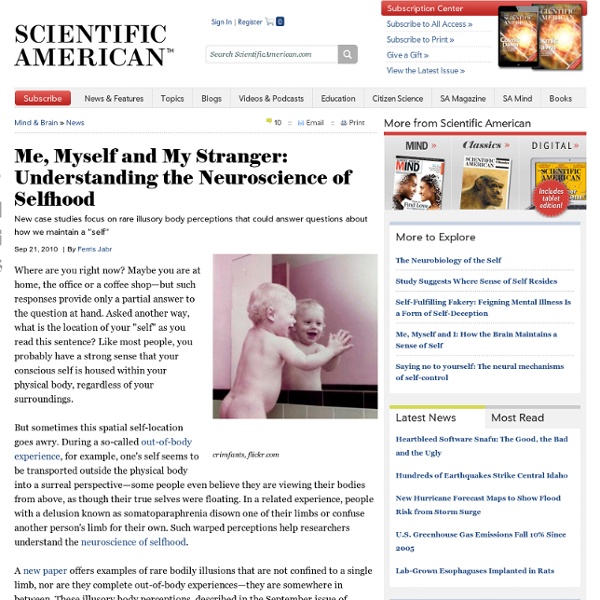10 More Common Faults in Human Thought
Humans This list is a follow up to Top 10 Common Faults in Human Thought. Thanks for everyone’s comments and feedback; you have inspired this second list!
1,000 Top Self-Help Books Summarized in 1 Page
There are over 210,000 self-help books on Amazon. Probably 1,000 are top self-help books. Just a guesstimate.
How to Live With an Unknowable Mind
We know surprisingly little about our own personalities, attitudes and even self-esteem. How do we live with that? How do you imagine your own mind? I sometimes picture mine as a difficult and contrary child; the kind that throws a stone at you for no reason and can’t explain itself. Or while at the beach it sits silent, looking miserable. But, at a wedding is determined to scream at the top of its lungs through all the quiet bits.
10 Psychological Effects of Nonsexual Touch
A simple (nonsexual) touch can increase compliance, helping behaviour, attraction, and signal power. To get around in the world, we mainly rely on our eyes and ears. Touch is a sense that’s often forgotten.
Color Psychology
by David Johnson Like death and taxes, there is no escaping color. It is ubiquitous.
The Single Most Effective Method for Influencing People Fast
Works like magic: a little-known influence technique that out-guns the usual suspects. Influence techniques vary considerably in how effective, ethical and easy to perform they are. At the easy, more ethical end of the spectrum, is affirming someone’s right to choose. This is a benign strategy which happens to have the handy side-effect of increasing persuasion.
Dunning–Kruger effect
Cognitive bias about one's own skill The Dunning–Kruger effect is a hypothetical cognitive bias stating that people with low ability at a task overestimate their own ability, and that people with high ability at a task underestimate their own ability. As described by social psychologists David Dunning and Justin Kruger, the bias results from an internal illusion in people of low ability and from an external misperception in people of high ability; that is, "the miscalibration of the incompetent stems from an error about the self, whereas the miscalibration of the highly competent stems from an error about others".[1] It is related to the cognitive bias of illusory superiority and comes from people's inability to recognize their lack of ability. Without the self-awareness of metacognition, people cannot objectively evaluate their level of competence. Original study[edit]
Resources for Victims of Sexual Abuse by Susan K. Smith, Atty., Hartford and Avon, CT.
Contents Site Feature Articles Legal Articles Other Reading
First 3D Map of the Brain’s Connections
We knew anatomy could be gorgeous, but this is beyond anything else we’ve ever seen, and it’s guaranteed to be something you haven’t seen, being the first 3D image of a brain’s connections. Van Wedeen, a Harvard radiology professor, is awestruck: “We’ve never really seen the brain – it’s been hiding in plain sight.” Conventional scanning has offered us a crude glimpse, but scientists such as Wedeen aim to produce the first ever three-dimensional map of all its neurons.
Do Dogs Know Death?
How animals perceive death has been a longstanding puzzle. That animals understand death and grieve for their losses is no longer the question. For example, in her ' Coming of Age With Elephants ', biologist Joyce Poole describes a mother elephant grieving for a stillborn baby-crying, slumped over, days on end spent desperately trying to revive her child. On another occasion Poole saw a troop moving through the forest when one of them fell over and died.
25 Acts of Body Language to Avoid
Our body language exhibits far more information about how we feel than it is possible to articulate verbally. All of the physical gestures we make are subconsciously interpreted by others. This can work for or against us depending on the kind of body language we use. Some gestures project a very positive message, while others do nothing but set a negative tone.



